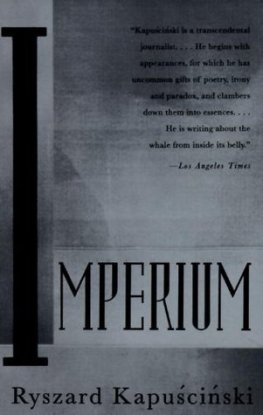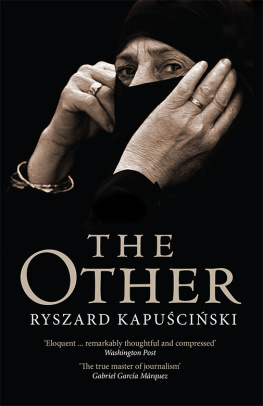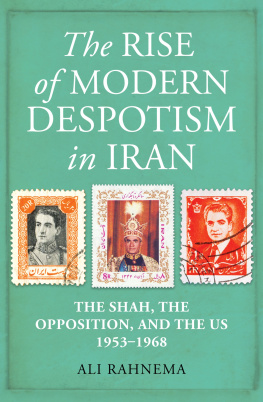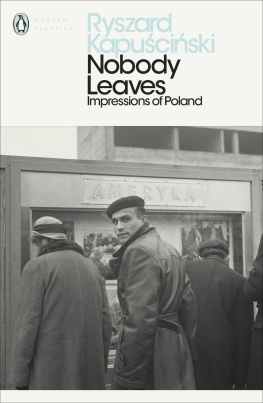
Table of Contents
First published in Great Britain by
Quartet Books Limited 1985
A member of the Namara Group
27/29 Goodge Street, London W1P 1FD
Copyright 1982 by Ryszard Kapuciski
English translation copyright 1985 by Harcourt Brace
Jovanovich, Inc.
Portions of this work originally appeared in
The New Yorker.
All rights reserved. No part of this publication
may be reproduced or transmitted in any form or
by any means, electronic or mechanical, including
photocopy, recording, or any information storage
and retrieval system, without permission in
writing from the publisher.
LIBRARY OF CONGRESS CATALOGING IN PUBLICATIONS
DATA
Kapuciski, Ryszard.
Shah of Shahs
Translation of: Szachinszach.
"A Helen and Kurt Wolff book."
1. IranPolitics and government19411979.
I. title
DS318.K315113 1985 955'.053 84-10838
ISBN-0-15-181483-X
Designed by Mark Likgalter
Printed in the United States of America
First edition
A B C D E
CARDS, FACES, FIELDS OF FLOWERS
Everything is in confusion, as though the police have just finished a violent, nervous search. Newspapers, local and foreign, are scattered everywhere, special editions, big attention-getting headlines,
H E H AS L EFT
large photos of a gaunt, elongated face, its controlled features so bent on showing neither anxiety nor defeat that it no longer expresses anything at all. Copies of later editions proclaim in fervor and triumph:
H E H AS R ETURNED
A severe patriarchal face that has no intention of expressing anything at all fills the rest of the page.
(And between that departure and that return, what heights of emotion and fervor, rage and terror, how many conflagrations!)
On the floor, chairs, table, desk lie heaps of index cards, scraps of paper, notes so hastily scrawled and chaotic, I have to stop and think where I jotted down the sentence "He will deceive you and make promises to you, but don't let yourself be fooled." Who said that? When? To whom?
Or, covering a whole sheet of paper in red pencil: "Must call 64-12-18." But so much time has passed, I can't remember whose number it is or why it was so important to call.
Unfinished letter, never mailed. I could go on at length about what I've seen and lived through here, but it is difficult to organize my impressions....
The worst chaos is on the big round table: photos of various sizes, cassettes, 8-mm film, newsletters, photocopies of leafletsall piled, mixed up together, helter-skelter, like a flea market. And more posters and albums, records and books acquired or given by people, the collected remnants of an era just ended but still able to be seen and heard because it has been preserved here on filmflowing, agitated rivers of people; on cassettesthe wail of the muezzins, shouted orders, conversations, monologues; in photosfaces in ecstasy, exaltation.
Now, at the very thought of trying to put everything in order (because the day I'm to leave is approaching), I am overcome by both aversion and profound fatigue. When I stay in a hotel (which is quite often) I like the room to be a mess because then the ambience has the illusion of some kind of life, a substitute warmth and intimacy, a proof (though illusory) that such a strange uncozy place, as all hotel rooms in essence are, has been at least partially conquered and tamed. In a room arranged into antiseptic order, I feel numb and lonely, pinched by all the straight lines, corners of furniture, flat walls, all that indifferent, stiff geometry, a strained, meticulous arrangement existing only for its own sake, without a trace of human presence. Fortunately, within a few hours of my arrival, influenced by my unconscious actions (the result of haste or laziness), the existing order breaks down, disappears, objects come to life, begin moving from place to place, and enter into ever changing configurations and connections; things take on a cramped, baroque look, and, all at once, the room's atmosphere becomes friendlier and more familiar. Then I can take a deep breath and relax.
Right now I cannot summon up enough strength to do anything with the room, so I go downstairs, where four young men are drinking tea and playing cards in a gloomy, empty hall. They've abandoned themselves to some intricate gameneither bridge nor poker, blackjack nor pinochlewhose rules I'll probably never grasp. They use two sets of cards at once, playing in silence, until at a certain moment one of them takes all the cards, a delighted expression on his face. After a pause they deal, lay dozens of cards on the table, ponder, count, and begin quarreling as they count.
These four, the reception staff, live off me. I am supporting them because I am the only guest in the hotel. I also support the cleaning woman, cooks, waiters, launderers, janitors, gardener, and for all I know several other people and their families, too. I don't mean to say that if I delayed settling my bill they would all starve, but I try to keep my account paid just in case. Only a few months ago it was an achievement, like winning a lottery, to get a room in this city. Despite the many many hotels, there was such an avalanche of people that new arrivals had to rent beds in private hospitals just to have a place to stay. Now the boom of easy money and dazzling transactions is over, the local businessmen are lying low, and the foreign partners have fled, leaving everything behind. Tourism has fallen to zero; all international traffic has frozen. Some hotels were burned down, others are closed or empty, and in one of them, guerrillas have set up their headquarters. Today the city is engrossed in its own affairs, it doesn't need foreigners, it doesn't need the world.
The cardplayers take a break from their game to offer me tea. Here they drink only tea or yogurt, not coffee or alcohol. For drinking alcohol you can get forty or even sixty lashes, and if someone brawny does the whipping (that type is often the most enthusiastic flogger) your back will be pulp. So we slurp our tea and watch the TV below the window at the other end of the hall.
Khomeini's face appears on the screen.
Khomeini is seated in a simple wooden armchair on a simple wooden platform in one of the squares of (to judge from the shabbiness of the buildings) a poor section of Qom. A small, flat, gray, charmless city, Qom lies a hundred miles south of Teheran in a vacant, wearying, parched, sunbaked desert. Nothing in that murderous climate would seem to favor reflection and contemplation, yet Qom is a place of religious fervor, rabid orthodoxy, mysticism, and faith militant. It contains five hundred mosques and the nation's biggest seminaries. Koranic scholars and the guardians of tradition quarrel in Qom; the venerable ayatollahs convene their councils there; Khomeini rules the country from Qom. He never leaves, never goes to the capital, never goes anywhere. He neither sightsees nor pays visits. He used to live with his wife and five children in Qom in a small house on a cramped, dusty, unpaved little street with a gutter running down the middle. Now he's moved to his daughter's house, from whose balcony he appears to the crowds in the street below (usually, zealous pilgrims visiting the mosques of the holy city and, most important of all, the tomb, forbidden to non-Muslims, of the Immaculate Fatima, sister of the eighth Imam Reza). Khomeini leads an ascetic life, eating only rice, yogurt, and fruit, and occupying but one room, bare walls, no furniture, only a bedroll on the floor, and a pile of books. Here, sitting on a blanket spread on the floor, leaning back against the wall, he receives his guests, including the most formal official foreign delegations. From the window he can see the domes of the mosques and the spacious courtyard of the medreshan enclosed world of turquoise mosaics, bluish-green minarets, coolness and shade. All day a steady stream of guests and petitioners passes through this room. When there is a break, Khomeini goes off to pray or stays in his room, devoting the time to reflection or simplyas is natural for a man of eightytaking a nap. The one with the most access to him is his younger son Ahmed, like his father a cleric. The other son, the first-born and the hope of his father's life, perished in mysterious circumstancestreacherously killed, people say, by Savak, the Shah's secret police.
Next page







